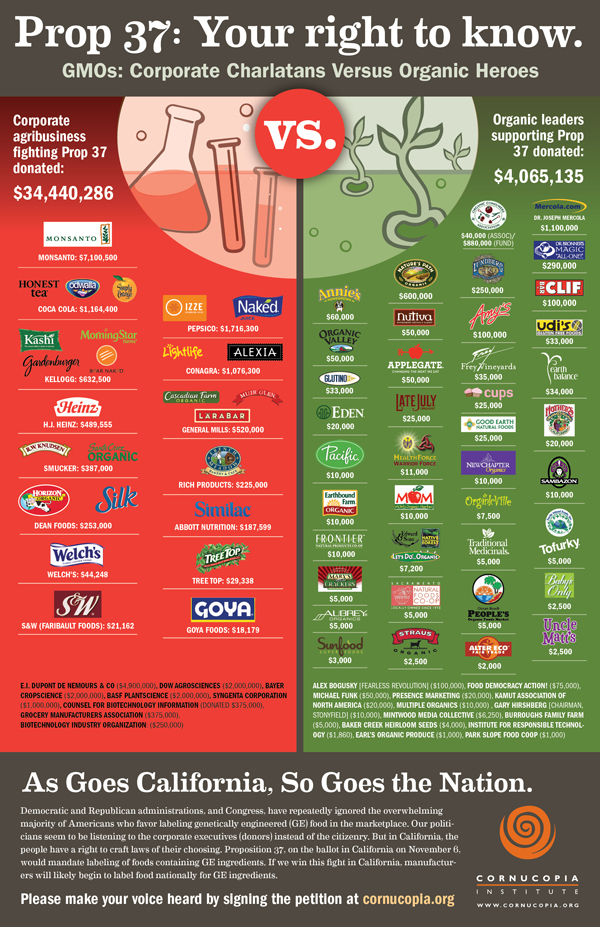It’s natural to assume the good in someone, or something. In this case, a brand. Brands like Kashi, Naked, Alexia, Larabar, and Silk have spent millions in marketing and packaging so that we’re comfortable with their do-gooder, earth-friendly, clean and organic food brand personas. These brands are the nemesis of classic grocery store junk. But they just may be the nemesis of conscious eaters everywhere, too, according to a new infographic produced by Cornucopia.org.
The vote in California next month on Prop 37, which would require labeling of GMO and GE food products, is as hot as the presidential election. That vote there, while only immediately effecting California, has the potential to create a new labeling standard across the country. As you can imagine, a GMO labeling law would require transparency where these brands have been able to slip under the radar previously. As well, where companies are the most concerned, it will cost them quite a bit of money to update labeling.

Right there in red and green, you can see which previously assumed supporters of natural, organic, clean foods are just a front for more secrecy behind the label. Dean Foods, parent of Horizon and Silk, has spent a quarter-million dollars to prevent labeling GMOs. Coca-Cola, with their Honest Tea and Odwalla brands, has spent 1.1 million dollars. Something about that doesn’t feel so honest.
On the flip side, the true “organic heroes,” the ones already being vocal and transparent, are committed to holding themselves and their competitors to a higher standard of consumer transparency. And honesty, really. Their budgets aren’t as big as the Monsanto roadies, but Applegate Farms, Annie’s, Earthbound Farms, Late July, Clif, Udi’s, Tofurkey, and Amy’s have collectively put up $383,000. That’s almost as much as Smucker, for their R. W. Knudsen and Santa Cruz Organic brands, with $387,000.
The leading organic brands have put $4.06 million dollars to support Prop 37, while the major food corporations, even with leading organic brands, have raised $34.4 million. No surprise, about 20 percent of that came from Monsanto with more than seven million dollars contributed. Right behind Monsanto comes Dupont with a near $5 million contribution against GMO labeling, then Dow with $2 million and Bayer with $2 million.
Trusting a brand, and what they’re putting in your body, goes far beyond what’s printed on a label. It’s much more than just black and white type, or a heartwarming ad campaign, or even pretty pictures on a box. Every dollar you spend is a vote for companies to continue what you’re doing. Make sure your voice is heard at the cash register and in the voting booth on November 6.
Here’s how:
- Use the following tags when tweeting about mandatory labeling of GMOs: #LabelGMOs #CARightToKnow #YesOn37
- Visit CARightToKnow.org to learn more and get more involved
- Follow Right to Know on Facebook
- Write an article on your blog or website voicing your position, helping to spread the GMO labeling word
Also Read:
Join the California Right to Know Campaign
4 Simple Tips for Avoiding GMOs
